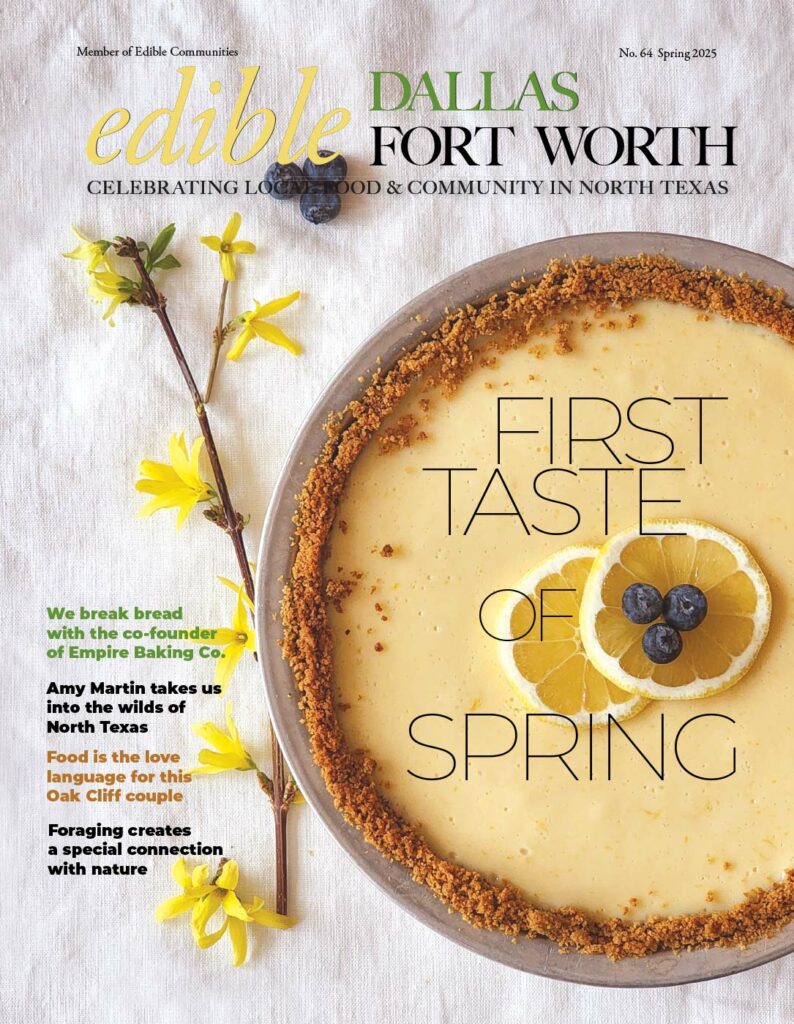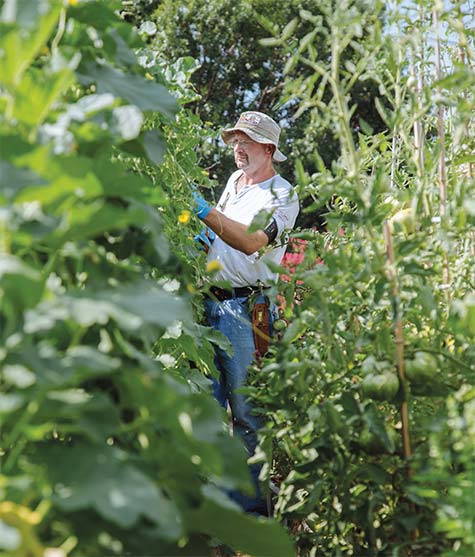
Chris Taylor in his Cedar Hill backyard garden.
Photography by Lauren McClure
A tall, mustachioed man pulls up in his white Honda and walks past valet parking to the service door of Oak restaurant in the Dallas Design District. In his arms, Chris Taylor hefts three plastic bins; the treasure within is his weekly delivery. Molecules of dirt still cling to the icicle radishes harvested an hour ago that will soon form a watermelon salad with fava beans. Chef Richard Gras has also requested parsley flowers and wild Italian arugula. Gras breathes in the parsley flowers’ aroma, buries his nose in the fanned-out radish leaves. Then he disappears, returning with compost scraps the kitchen staff has set aside. Air-sealed bags contain asparagus stems and peelings, leathery leek tops, shallot scraps, eggshells. There are two trash bags of pea shells, one of fava hulls.
“Those are really high in nitrogen,” Taylor tells me excitedly. The exchange I’m witnessing represents the farm-to-table model coming full circle—garden to kitchen to garden again. Come with bounty, leave with bounty. Bounty, that is, in the eyes of a Master Gardener/ Master Composter alchemist who is turning restaurant scraps into horticultural gold in his Cedar Hill backyard.
At both Oak and neighboring restaurant FT33, Taylor has found forward-thinking chefs willing to invest in the soil that feeds the produce he brings to their door. Storing a week’s worth of scraps in a restaurant kitchen isn’t easy: walk-in refrigerators are prime real estate and scraps stored outside might attract unwelcome guests.
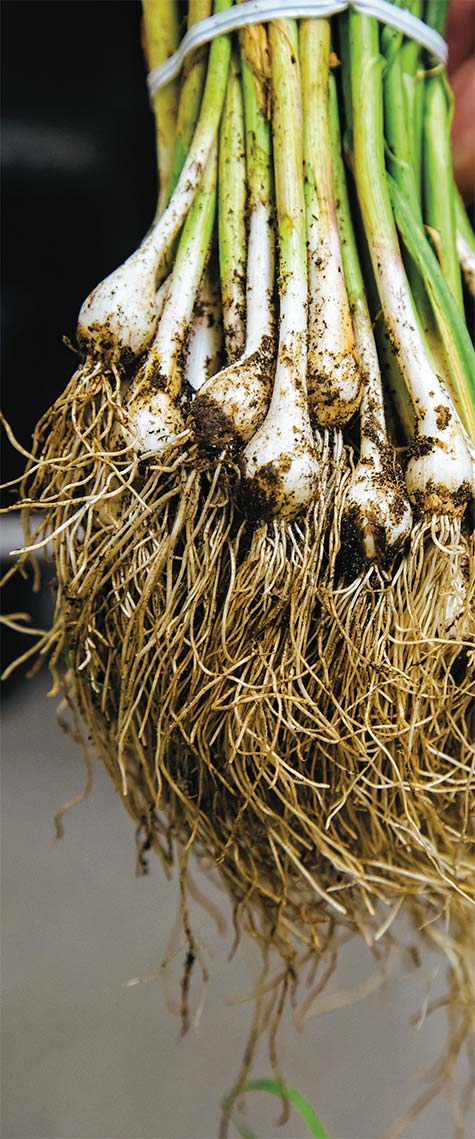
Taylor sends me a text when he gets home from Oak: the scraps weighed in at 63 pounds, the biggest load since their partnership began in the spring. It’s not so much the weight, but the volume—the sheer bulk of those trash bags full of fava bean and pea shells.
At FT33, space is even more limited. Executive Chef Matt McCallister’s vegetable-focused menu and strong liaisons with local farmers means produce moves in and out daily at peak freshness. As we stand in the walk-in fridge, barely bigger than a phone booth, Chef de Cuisine Bradford Hodgkins tells me they can only save scraps for Taylor starting a day and a half ahead. Any sooner and they’d be space-strapped. I see why. Yet they’re invested in this man whose passion is compost.
On the day I visit Taylor’s backyard, the air is festooned with mockingbird song and a chaise lounge reclines under a peach tree, between raised beds. Along the house grow thyme, parsley, oregano, sorrel, lemon grass and blackberry bushes whose berries are just inking up. Taylor’s mother has always gardened, and Taylor remembers eating cherries right out of the tree at their home when he was small.
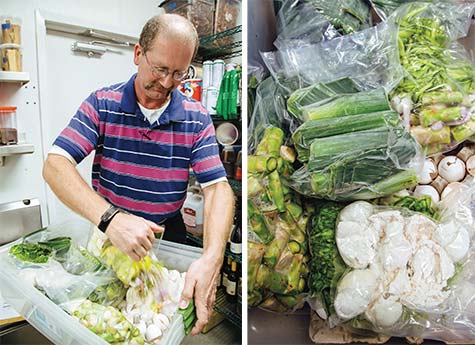 Taylor (top left) inspects kitchen scraps at Oak restaurant,
Taylor (top left) inspects kitchen scraps at Oak restaurant,
where collecting compostables has become part of closing duties.
He now practices a form of gardening often called French intensive or square-foot gardening—characterized by close planting and verticality to maximize yield in a small space. A fleet of multi-colored watering cans stands ready to disperse homemade compost tea, supplemented with molasses. Taylor rises at 6 a.m. to check soil moisture, and then gardens until his afternoon shift as supply chain technician at Baylor Cancer Center, a shift that ends at 11 p.m. Composting was always part of Taylor’s practice, though the science was imprecise. “I just used to throw my old scraps in the back and let them do their own thing. And that was composting.” Then, in 2012, he took a Master Composter certification course offered by the City of Dallas Waste Diversion Department and held at the Dallas Farmers Market.
“It opened up my eyes to a whole new world,” he says. He discovered hot composting, a technique in which piles are allowed to reach internal temperatures of at least 131°F, speeding up decomposition and killing harmful bacteria and seeds that might sprout in a garden as “volunteers.”
Taylor uses a long thermometer to probe the piles. Once they reach optimum temperature, he lets them cool, flipping them two or three times before the compost is ready. In three to four months, the eggshells and leek tops have become dark, nutrient-dense soil. Generating the heat that aids decomposition requires a judicious layering of compost’s two components. Brown matter, in the form of dry leaves, provides carbon; green matter, in the form or grass clippings and vegetable scraps, provides nitrogen.
The balance has to be just right. Taylor’s first hot-composting attempt failed. “Oh, man, it stunk up a storm,” he says, chuckling. The culprit: too much nitrogen-rich green matter. But the next pile was perfect, and now he estimates he’s made between 50 and 100. On one side of his shed stand two piles in progress, their brown and green layers distinct, like a horticultural layer cake; on the other, finished piles, ready to be sifted. His goal is to maintain five or six continuously to feed the nutrient-hungry garden and keep the beds full. In the fall he collects the bagged leaves people leave on curbs. Unusual, perhaps, but not illegal, as confirmed by his account of a pleasant conversation with an initially puzzled police officer. He estimates he’s collected over 250 bags each of the last four years, transporting them in his car trunk to where they queue out of sight, behind the house.
The garden is Taylor’s laboratory. “I like to experiment,” he says. One year, he planted only garlic, harvesting around 1,000 heads. Another year, he gave away unknown numbers of the 250 melons he’d grown. His mother’s latest Christmas gift to him was 14 varieties of organic heirloom tomato seeds along with a book on growing them. One bed now harbors an impressive collection—among them German Red Strawberry, Green Zebra, Purple Prudence and Black Cherry. The bed currently planted with arugula will soon sprout tan, black and white sesame, something Taylor is trying on a lark. He’s not afraid to fail, he says.
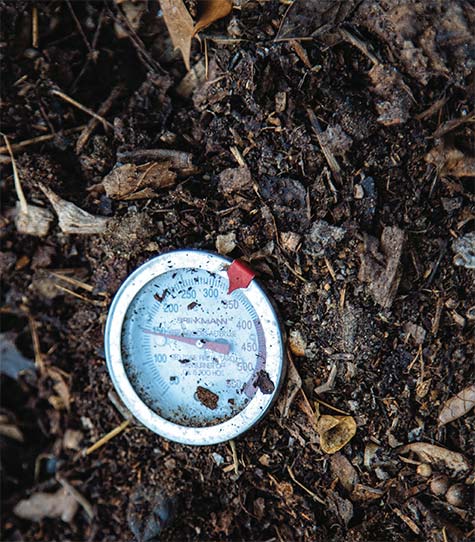
“It’s what I’m able to do,” he says with an
earnest shrug, then breaks into a smile. “If
everybody did this, we would have Kumbaya
around the world and everybody would be happy.”
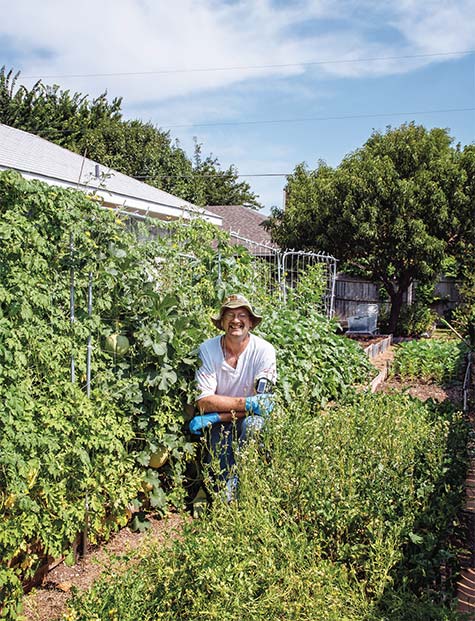
His boldness and optimism make Taylor a match for the chefs he works with, and may explain how he went from backyard gardener to provisioner for two of the city’s most high-profile restaurants. FT33 came first. Taylor had read of McCallister’s support of local farmers. So one day last November, he showed up with several pounds of carefully curated wild Italian arugula.
“I was such a noob,” he says,“I had it tied up in quarter-pound bundles.”
McCallister took the lot. Before they parted, he also handed Taylor a quarter pound of mustard seeds, saying, “Here, plant this.” Taylor points to the bed that now holds heirloom tomatoes. “In the winter, this whole bed was full of mustard,”—Scarlet Frills, a variety that grows like a froth of purple leaves on brilliant green stems. “It was beautiful.” Thus commenced a partnership of mutual inspiration that soon extended to Oak.
Taylor received a wish list early on from FT33 that included hyssops and varieties of basil he’d never grown before. He dove in. McCallister also expanded Taylor’s sense of the growing and harvesting cycle. Taylor remembers the day he delivered cilantro and McCallister asked that he save the flowers, which the chef uses for garnish. Taylor was dumbfounded: he’d been composting the blossoms.
“All this time I was sitting on a goldmine,” he says. Now, the flowers end up in his own salads at home.
Composting has been its own revelation. Trying to recall how he brought it up, Taylor says, “I think I just asked, ‘Hey, by the way, do you guys throw away any vegetable scraps?’”
Chefs are cognizant of waste. Particularly chefs who care deeply about the quality and provenance of their ingredients. They turn trimmings into stock, overripe fruit into vinegars. Every morsel is precious. But even a kitchen run efficiently with a snout-to-hoof, blossom-to-root mentality produces waste for which there seems no obvious use.
Composting, then, is an extension of forward-thinking practices already in place. The trick is to build new habits in an environment where gestures are honed to be routine and rapid-fire. A flick of the wrist jettisons a peel. “It’s training your mind to not do that,” says McCallister. Now, he’s even setting aside bones. Taylor has started making bone meal by roasting bones in his backyard grill until they crumble. At Oak, Cryovacking Taylor’s scraps have become a part of closing duties.
“It’s part of the ethical responsibility of the people in this business,” says Brian Zenner, who recently replaced Gras as Oak’s Executive Chef and is committed to continuing the partnership with Taylor.
“It’s important to support anyone that’s about that,” he says. Particularly in a place like Dallas where the movement is still nascent.
“It’s the future. It’s just a question of how fast we get to it.”
Taylor’s motivation, too, is firmly rooted in a sense of the big picture. “Those leaves … they’re never going to deteriorate in the landfill. It’s a terrible waste of a natural resource.” And so he bundles leaves into his trunk, loads up with asparagus peelings, and turns them into soil to feed his vegetables, which in turn feed and bring pleasure.
“It’s what I’m able to do,” he says with an earnest shrug, then breaks into a smile. “If everybody did this, we would have Kumbaya around the world and everybody would be happy.”
His goal for next winter is to pick up 10,000 bags of leaves. He may have to buy a truck, he speculates—and possibly a trailer.
EVE HILL-AGNUS teaches English and journalism and is a freelance writer based in Dallas. She earned degrees in English and Education from Stanford University. Her work has appeared in the Dallas Morning News, D Magazine, and the journal Food, Culture & Society. She remains a contributing Food & Wine columnist for the Los Altos Town Crier, the Bay-Area newspaper where she stumbled into journalism by writing food articles during grad school. Her French-American background and childhood spent in France fuel her enduring love for French food and its history. She is also obsessed with goats and cheese.
- Eve Hill-Agnushttps://www.edibledfw.com/author/ehillagnus/
- Eve Hill-Agnushttps://www.edibledfw.com/author/ehillagnus/
- Eve Hill-Agnushttps://www.edibledfw.com/author/ehillagnus/
- Eve Hill-Agnushttps://www.edibledfw.com/author/ehillagnus/


